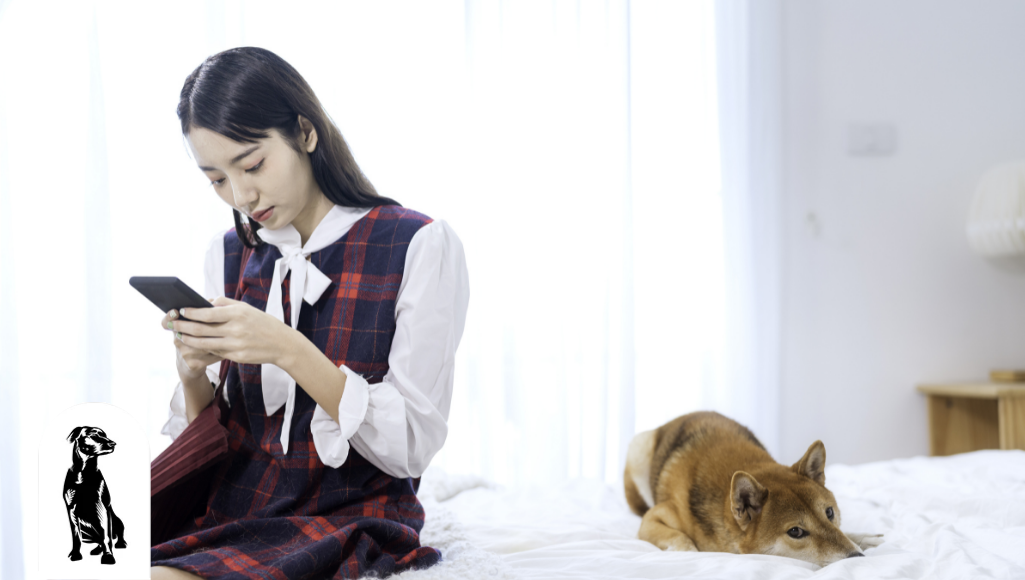
If your dog is acting unusual, looks depressed, or is not in the mood for the things they usually love, there's a chance your dog is stressed out.
Yes, dogs can get stressed too, and it's more common in dogs than you might think. And if left untreated, stress can have a huge effect on your dog's health. Keep reading to learn what signs you should be looking for if you think your pup is stressed and comfort them during this difficult time for them.
When Your Dog Is Relaxed
Before we get to the main topic, let's first discover what your dog looks like when they are in a relaxed state.
When your dog is relaxed, you can clearly see it in its face. The fact that it looks like your dog is smiling is an indication that your dog is in a relaxed state. You'll see it first in their eyes as they are soft and rounded. Ears are semi-erect, and if they are approaching a person, his ears will go back a bit as a polite gesture. If your pup is moving around and having fun like they typically do, it's safe to assume that your pup is both relaxed and happy.
If the stress in your dog is left unaddressed, there's a good chance that their behavior will seem like it's morphing into something completely different than your usual happy four-legged friend.
So now that you know how you should expect your dog to be when they are relaxed let's go over some of the signs that will indicate if your dog is stressed.
Constant Isolation
If you are noticing that they hide, go in the corner often, or just want to be alone, this can be the first sign that they are stressed out. Another reason that a dog will isolate itself is that they are not feeling well. It's essential to recognize the difference between your dog gaining independence from you and hiding because they are not feeling up to par.
Decrease in Appetite
Does your pet suddenly lose interest in eating or stops eating altogether? It could be possible that they are stressed. This behavior can also be attributed to underlying health conditions that caused your dog to refuse to eat or reduce food intake. If you notice other behaviors that indicate an illness or underlying condition, consult your veterinarian. If you notice they aren't eating anymore and other behaviors match with other ones as listed in this blog, there is a good chance that your dog is stressed.
Aggression Over Dogs and People
If your dog is aggressive over another dog or even people all of a sudden, then it could be a sign that your dog is stressed out. If this happens often, you should consult a veterinarian because it will worsen as they continue this behavior if it becomes normalized in your home. Some signs of aggression include:
- Growling
- Whining and Barking
- Snarling
- Snapping
- Standing tall
- Holding ears high
- Stiff movements in the tail
- Biting
Aggressive signs are accompanied by fearful body posture, distinct facial expressions, and submissive behavior.
Note that some of these behaviors can be seen as playful in certain situations, like barking and standing tall; get to know your pup and learn the difference between wanting to play and acting in aggression towards others.
Pacing
According to the American Kennel Club, "when canines are pacing back and forth, it's a sign they can't settle down because something is stressing them." It may be okay for a dog to do this if they need to go outside if they are hungry, or for short periods of time, but if you notice that your pup is doing this often, you'll likely find that it's due to stress.
Treating Stress
The first and most important thing you can do when you notice your dog is stressed is to evaluate your own behavior. In many cases, pet owners may not realize how much their dog picks up on the way they are acting. Owners who are stressed out may be causing stress in their dogs by not giving them clear commands, punishing them unnecessarily, or neglecting their pup in certain situations. That's not to say that all owners are to blame for the stress of their dog. Like humans, some dogs just can't help but be anxious in certain situations.
Stress can't be cured right away but can be alleviated. So one of the best things you can do to treat your dog's stress levels is to give your dog the chance to get some energy out or participate in physical activities that can calm your dog's nerves.
While different breeds of dogs need various amounts of exercise, keeping your dog stimulated, and active will greatly reduce anxiety and stress levels. We suggest researching your dog's breed and how much exercise they require. Remember, a happy dog is a healthy dog! And with that said, make sure your dog has a well-balanced diet that includes all the nutrients they need.
Another great way to help them feel less stressed out is to give them a safe zone. Set apart an area for your pet to hide or escape to when there are high-stress events like loud music, fireworks, thunderstorms. If you can, stay with them until the thing that stresses them has passed. Staying with them is like telling them that everything is going to be okay.
Plush Paws Products for Your Pup
Maybe your dog is having an off day, maybe they are anxious, or maybe your dog is stressed out; no matter what is going on, we know you want the very best for your four-legged furry friend. That's why Plush Paws Products creates only the best products for every pup across the world. With worldwide shipping, we aim to help owners and dogs be the best companions for one another. Shop our car seat cover options that will keep your dog comfortable and your car clean, and also shop our specially formulated health products for dogs that will keep them healthy for years to come!
